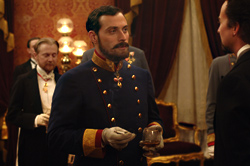And now, for my next trick, I am going to make this movie disappear. It works like this: Stride solemnly onstage in pre–World War I Vienna, preferably wearing a cape. Make a little small talk with the audience, pull some pennies from a woman’s ear, maybe erase the image from a mirror. (But nothing so tacky as sawing a lady in half. Please.) But for the big magic, the stuff that really packs the hall, lose the cape, clench your jaw beneath the goatee, and fix an unyielding and inscrutable stare at some fixed point in the balcony. Do your best to look as abstractedly pissed off as Edward Norton—the world is so stupid, and now you have no choice but to pay attention to me!
Then press a button on your computer, and let the CG perform its digital miracles, dissolving characters into a vapor that wafts over the astonished throng.
Of course they didn’t have computers in the 1900s, but apparently wandering magician Eisenheim (Edward Norton) discovered Pixar during his 15 years in the Orient. By the time he returns to Vienna, his childhood love has grown into a princess (Jessica Biel), and he, a humble woodworker’s son, has reinvented himself and raised his station to the point where evil Prince Leopold (Rufus Sewell) takes notice. He dispatches Chief Inspector Uhl (Paul Giamatti) to spy on Vienna’s new stage sensation. All those crowds, those mobs, those impressionable spectators watching Eisenheim, turn the established order on its head—there’s a political threat. “You can’t bring down the monarchy,” Uhl warns, not understanding that Eisenheim intends to steal Princess Sophie away from her fiancé’s cruel hand. (It’s bad enough that, with his mustache, Sewell looks like Snidely Whiplash; the movie also has him regularly slap down women just so we get the idea.)
The best thing about this film—SIFF’s gala opening feature, you may recall—is its gaslight-and-sepia patina (thanks to cinematographer Dick Pope), the Prague locations so unchanged after a century, a vintage postcard come to life. Director Neil Burger adapted the movie from a 1990 short story by Steven Millhauser, and there are historical allusions to the catastrophes that would soon wreck most of Mittel Europe. Leopold raves like Hitler about “mongrels” in the streets, and Eisenheim is pointedly Jewish. Yet The Illusionist never develops its politics any more than its characters: Leopold is despicable from start to finish, Sophie is pretty (but inert), and Eisenheim is less an agent of revolutionary change than a dour fellow seriously stuck on a girl. (It doesn’t help that his greatest trick, the central mystery that Uhl narrates to us, is laughably predictable.)
Still, any film with Paul Giamatti can’t be all bad, and he helps smarten up the proceedings. When Norton asks, “Are you completely corrupt?” he doesn’t even hesitate to reply: “No, not completely, no.” Claude Rains lives, which shows there’s still a little magic left at the movies. BRIAN MILLER








